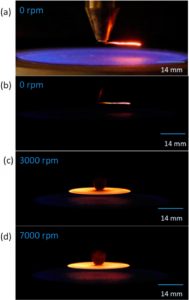

Temperature is among the most important measurements in reacting flow studies, as it contains information about chemistry, emissions and efficiency. And the thermocouple is the workhorse of temperature measurement, as they are inexpensive, robust and precise and can be used to measure a wide range of temperatures. Unfortunately, thermocouples also are subject to errors associated with heat loss (or gain) due to radiation. Characterization of this error is difficult and subject to considerable uncertainties, particularly in turbulent, particle-laden flows. Past approaches, like suction pyrometry, have faced significant challenges with regards to accuracy and spatial resolution.
LACER has developed a novel temperature measurement technique, in which high-speed rotation is used to create a controlled, high convective heat transfer coefficient that in turn yields a highly accurate temperature measurement without sacrificing spatial resolution. The measurements made by this technique can also be mathematically deconvolved to yield spatial resolution approaching that of a fine-wire thermocouple.

